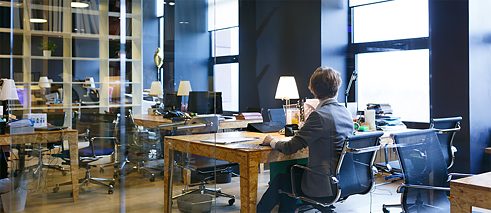New working cultures
The call of the city

To present themselves as an attractive place to live, Germany’s urban centres are embracing innovative concepts for the modern world of work.
Startups, freelancers, digital nomads – the digitalisation of the working world has changed expectations of the physical working environment. Office buildings with long carpeted corridors where the working day begins at a time clock long ago ceased to be found attractive by many employees. Company founders and freelancers want a fitting (preferably urban) environment for their activities and find startup hubs and co-working spaces an appealing option. Meeting their requirements calls for innovative ideas from planners and developers. German cities are focusing particularly on developing the necessary infrastructure and family-friendly amenities but green initiatives are also making them a more attractive place to live.
Green city with a mining background
Nowhere in Germany has seen such a dramatic change in the employment market as the Ruhr. Where manufacturing and mining were once dominant, trade and services are now the boom sectors. The city of Essen has been particularly successful at transforming itself from an industrial hub to an innovation hotspot. Economic output rose by nearly 30% from 2005 to 2015 – well above the national average – and per capita income is higher than anywhere else in the Ruhr region. What is more, Essen has succeeded in changing its image from coal town to green city. In 2017, it won the European Green Capital award. A whole range of projects have made Essen not only greener but also better endowed with leisure facilities. Before the “Seaside Beach” opened on the Baldeney reservoir, the Ruhr had not had a bathing area for more than forty years. Today, Lake Baldeney is encircled by a nearly 30 km hiking trail. Greening initiatives have also transformed the city itself. 42% of the municipal area is green space and 12% is recreational space. This is good for residents and also for tourism: in 2017 Essen attracted around 7.5% more visitors than the year before.
The working day in a co-working space
Berlin presents itself as Germany’s leading startup city. Access to venture capital and low office rents attract large numbers of young entrepreneurs. The city registers around 500 tech startups a year. To ensure there is enough space for them all, old industrial buildings are being converted into modern work and creative spaces that appeal to everyone from artists to computer programmers. At KAOS Berlin, for example – a former transformer station and cable factory – graphic designers and software developers work in a co-working community alongside brewers and blacksmiths. Freelancers can rent a workroom at KAOS for 125 euros a month, which is less than the cost of a garage in many other European cities. Elsewhere, at the innovation space Ahoy! Berlin for instance, co-working spaces are available for as little as 15 euros a day, catering for those who prefer to be flexible. Startups and freelancers thus find a wide range of affordable office space in Berlin. But the capital also scores points for culture, environment and infrastructure. The Economist’s Global Liveability Index for 2018 ranks Berlin as one of the 30 most liveable cities in the world, along with Frankfurt, Hamburg, Munich and Düsseldorf.
Seal of approval for family-friendly policy
Hamburg is another startup hotspot – one that particularly seeks to offer an agreeable working environment for young families. “Attractive living conditions for families are an important locational factor, especially for skilled professionals,” says Hamburg’s Senator for Family Affairs Melanie Leonhard. To raise employers’ awareness of the advantages of family-friendly HR management, the city launched a “Family Seal” in 2007, which is awarded to companies that support employees’ efforts to reconcile a career with a fulfilling family life. In the meantime the city itself has invested increasingly in family amenities. In 2018, Hamburg will spend around half a billion euros on education and child care as well as science and innovation. € 160 million is earmarked for day-care facilities alone, which feed into a system with an impressive number of all-day schools. In 2017, Hamburg was voted the most family-friendly city in Germany.
In terms of work-life balance, however, it is not the big cities that perform best. According to employer rating portal Kununu, Karlsruhe tops the table in this respect, followed by student city Münster. Employees benefit, in particular, from flexible working hours and the option to work from home. So, for anyone seeking a stable job rather than self-employment, Hamburg and Berlin are not the only options.